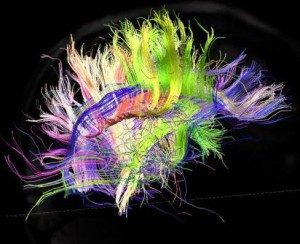26 August 2014. Carnegie Mellon University in Pittsburgh organized an international consortium of researchers to apply computer science techniques to the study of brain research and behavior. The collaboration, known as BrainHub, includes researchers from nearby University of Pittsburgh, as well as Sun Yat-sen University in Guangzhou, China, Indian Institute of Science in Bangalore, and Oxford University and the University of Warwick in the U.K.
BrainHub aims to apply computational tools to learn more about cognition and learning, as well as uncover new insights into brain disorders such as autism and Parkinson’s disease. The five year, $75 million project is funded by a combination of new and existing allocations from foundations, local and federal government, individual donors, institutional partners, and internal university sources.
The consortium plans to develop new methods for measuring and understanding the connections between brain functions and behavior. Most current techniques, says CMU, focus on single brain cells or small groups of cells. This initiative seeks to develop better devices for recording brain cell activity, as well as the tools to analyze that activity, to better understand the functioning of the entire brain, not just small parts. The project also plans to identify changes in brain cell activity and correlate those activities with corresponding behavioral changes.
Another BrainHub objective is development of new methods for training the brain to improve its performance or treat neurological conditions, taking advantage of CMU’s previous work in computer-based training to analyze the brain’s changes during the learning process. This part of the project also plans to better understand the brain’s plasticity for learning new skills, as well as treat traumatic brain injuries and depression.
In addition, BrainHub plans to develop new computation tools to better collect and analyze the growing body of data in neuroscience and human behavior, in effect applying tools of “big data” to the field. The university says one of the obstacles facing researchers is the lack of large scale data sets describing brain functions, structure, and properties of brain cells, as well as their responses in humans or animals. The researchers hope to devise better techniques to integrate these data sets and analyze contributions from colleagues worldwide.
The international partners are expected to bring a variety of research expertise to BrainHub. Sun Yat-sen University will offer work from its medical faculty on Alzheimer’s disease and autism. Oxford University will offer contributions from its International Brain Mechanics and Trauma Lab. University of Warwick is contributing its expertise in digital health. And Indian Institute of Science is sharing work from its own brain institute.
CMU says it plans to encourage dissemination and commercialization of findings from BrainHub, and is expected to tap into its ProSeed and Simon Initiative funds to help get promising new projects off the ground.
Read more:
- DARPA Funding Development of Brain Implants to Boost Memory
- Medical Centers to Develop Brain Signal Tracking, Therapies
- Alzheimer’s Brain Stimulation Implants Completed for Trial
- UC-San Francisco Launches Brain Disease Trial Registry
- Biosensor Detects Brain-Damaging Proteins in Heart Surgery
* * *


 RSS - Posts
RSS - Posts
You must be logged in to post a comment.